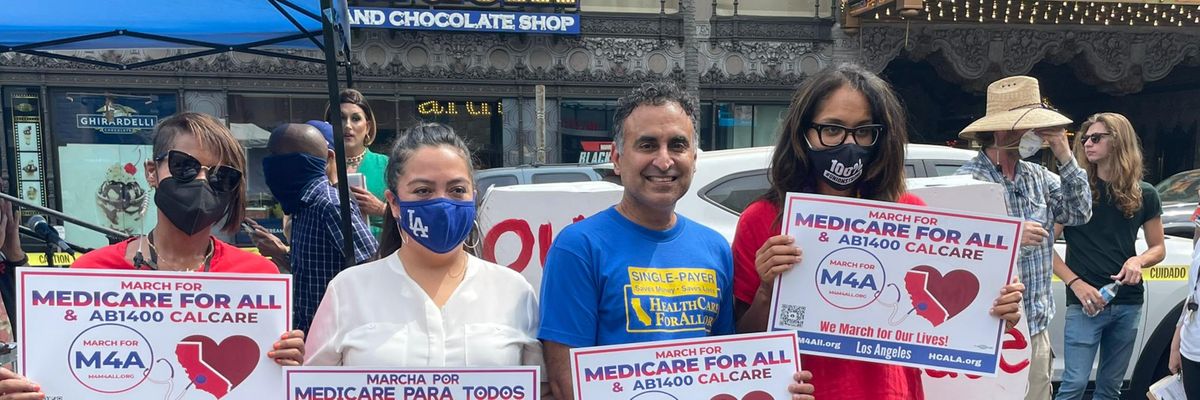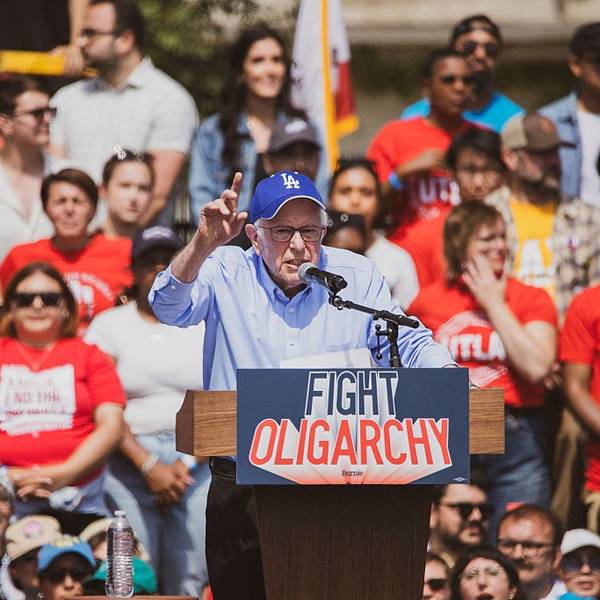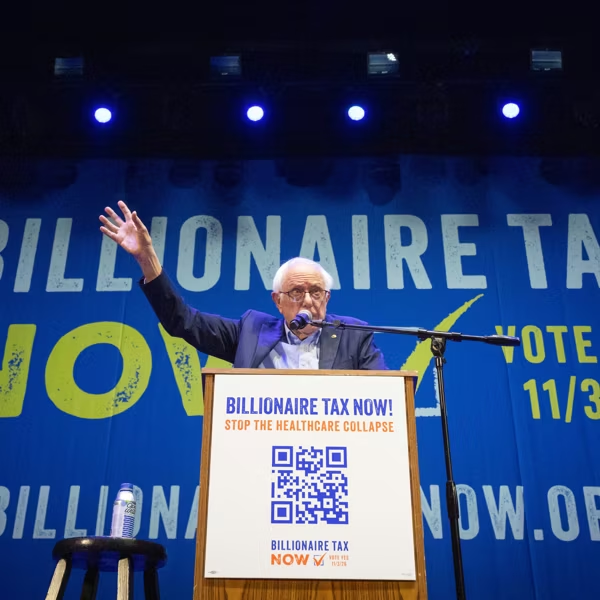
Advocates for A.B. 1400--California's single-payer healthcare bill--pose for a photo with state Assembly Member Ash Kalra (second from right), the San Jose Democrat who introduced the measure, in Los Angeles on July 24, 2021. (Photo: The Political RN/Twitter)
California Single-Payer Bill Withdrawn--What You Need to Know
If passed and signed into law, A.B. 1400—which would create a program popularly known as CalCare—would make the Golden State the first in the nation to provide universal healthcare coverage.
Update:
A.B. 1400, California's single-payer healthcare bill, has been withdrawn from consideration for a floor vote by the state Assembly in an eleventh-hour move that has shocked and outraged progressives.
Earlier:
The California State Assembly prepared to vote Monday on a bill that would provide single-payer healthcare coverage to nearly 40 million Californians and make the Golden State the first in the nation with universal healthcare.
"If CalCare becomes a reality, it would offer a critical precedent for similar single-payer bills in states across the nation."
The proposed legislation, A.B. 1400 or the California Guaranteed Health Care for All Act, would create the California Guaranteed Health Care for All program--popularly known as CalCare. The bill was introduced by Assembly members Ash Kalra (D-27), Alex Lee (D-25), and Miguel Santiago (D-53) and is sponsored by the California Nurses Association and National Nurses United.
If passed and signed into law by Democratic Gov. Gavin Newsom, A.B. 1400 would provide all medically necessary healthcare to every California resident, regardless of immigration status, with no co-pays, deductibles, or out-of-pocket costs. The bill would extend healthcare coverage to nearly three million uninsured Californians and provide benefits including dental, hearing, and vision care, and prescription drug coverage.
A.B. 1400 requires a simple majority vote in the Assembly and Senate to pass. There are currently 60 Democrats, 19 Republicans, and one Independent serving in the Assembly, and 31 Democrats and nine Republicans in the Senate.
A separate measure, Assembly Constitutional Amendment (ACA) 11--introduced by Kalra and Lee--would fund CalCare via a gross receipts tax, payroll tax, and a personal income tax on high earners. Two-thirds of both houses of the state Legislature must vote "yes" in order to approve the amendment.
A.B. 1400 cleared its first major legislative hurdle when the Assembly Health Committee voted 11-3 to approve the bill earlier this month. The Appropriations Committee then voted 11-3 to advance the measure.
California Democratic Party Progressive Caucus Chair Amar Shergill said last week that Democrats who vote "no" on A.B. 1400 risk losing the party's endorsement.
"Any Assembly member that thinks they can ignore the party, ignore labor, ignore people, vote against us, and then still get the endorsement might find they have a tougher reelection battle than they thought," the Sacramento trial attorney warned.
Newsom, who campaigned on a pledge to deliver single-payer healthcare, has disappointed activists by backing away from his promise. The governor has taken hundreds of thousands of dollars in campaign contributions from the private health insurance industry--which, along with business interests including the state Chamber of Commerce and multiple medical groups, oppose the bill--and some critics claim this is why he won't support A.B. 1400.
Asked about CalCare earlier this month, Newsom said: "I think that the ideal system is a single-payer system. I've been consistent with that for well over a decade."
"The difference here is when you are in a position of responsibility, you've gotta apply, you've gotta manifest, the ideal," he added. "This is hard work. It's one thing to say, it's another to do. And with respect, there are many different pathways to achieve the goal."
California Nurses Association organizer Alyssa Kang told CalCare advocates on a conference call last week that "we want to be absolutely clear: This is a flip-flop from a governor who said... 'I'm tired of politicians saying they support single-payer but that it's too soon, too expensive, or someone else's problem. This is absolutely unacceptable, and he cannot be allowed to have it both ways."
Advocates say CalCare is sorely needed: According to a California Health Care Foundation survey published last week, 49% of respondents skipped or postponed needed care over the past year because they couldn't afford it, and 47% said their health worsened as a result. One in four Californians also said someone in their family had trouble paying medical bills during the same period.
Passing A.B. 1400 would have national implications for the only country in the developed world that does not provide universal healthcare coverage for its people.
"If CalCare becomes a reality," writes Sonali Kolhatkar for the Independent Media Institute's Economy for All, "it would offer a critical precedent for similar single-payer bills in states across the nation, unleashing momentum behind the undeniable importance of ensuring free, publicly funded healthcare for all."
An Urgent Message From Our Co-Founder
Dear Common Dreams reader, The U.S. is on a fast track to authoritarianism like nothing I've ever seen. Meanwhile, corporate news outlets are utterly capitulating to Trump, twisting their coverage to avoid drawing his ire while lining up to stuff cash in his pockets. That's why I believe that Common Dreams is doing the best and most consequential reporting that we've ever done. Our small but mighty team is a progressive reporting powerhouse, covering the news every day that the corporate media never will. Our mission has always been simple: To inform. To inspire. And to ignite change for the common good. Now here's the key piece that I want all our readers to understand: None of this would be possible without your financial support. That's not just some fundraising cliche. It's the absolute and literal truth. We don't accept corporate advertising and never will. We don't have a paywall because we don't think people should be blocked from critical news based on their ability to pay. Everything we do is funded by the donations of readers like you. Will you donate now to help power the nonprofit, independent reporting of Common Dreams? Thank you for being a vital member of our community. Together, we can keep independent journalism alive when it’s needed most. - Craig Brown, Co-founder |
Update:
A.B. 1400, California's single-payer healthcare bill, has been withdrawn from consideration for a floor vote by the state Assembly in an eleventh-hour move that has shocked and outraged progressives.
Earlier:
The California State Assembly prepared to vote Monday on a bill that would provide single-payer healthcare coverage to nearly 40 million Californians and make the Golden State the first in the nation with universal healthcare.
"If CalCare becomes a reality, it would offer a critical precedent for similar single-payer bills in states across the nation."
The proposed legislation, A.B. 1400 or the California Guaranteed Health Care for All Act, would create the California Guaranteed Health Care for All program--popularly known as CalCare. The bill was introduced by Assembly members Ash Kalra (D-27), Alex Lee (D-25), and Miguel Santiago (D-53) and is sponsored by the California Nurses Association and National Nurses United.
If passed and signed into law by Democratic Gov. Gavin Newsom, A.B. 1400 would provide all medically necessary healthcare to every California resident, regardless of immigration status, with no co-pays, deductibles, or out-of-pocket costs. The bill would extend healthcare coverage to nearly three million uninsured Californians and provide benefits including dental, hearing, and vision care, and prescription drug coverage.
A.B. 1400 requires a simple majority vote in the Assembly and Senate to pass. There are currently 60 Democrats, 19 Republicans, and one Independent serving in the Assembly, and 31 Democrats and nine Republicans in the Senate.
A separate measure, Assembly Constitutional Amendment (ACA) 11--introduced by Kalra and Lee--would fund CalCare via a gross receipts tax, payroll tax, and a personal income tax on high earners. Two-thirds of both houses of the state Legislature must vote "yes" in order to approve the amendment.
A.B. 1400 cleared its first major legislative hurdle when the Assembly Health Committee voted 11-3 to approve the bill earlier this month. The Appropriations Committee then voted 11-3 to advance the measure.
California Democratic Party Progressive Caucus Chair Amar Shergill said last week that Democrats who vote "no" on A.B. 1400 risk losing the party's endorsement.
"Any Assembly member that thinks they can ignore the party, ignore labor, ignore people, vote against us, and then still get the endorsement might find they have a tougher reelection battle than they thought," the Sacramento trial attorney warned.
Newsom, who campaigned on a pledge to deliver single-payer healthcare, has disappointed activists by backing away from his promise. The governor has taken hundreds of thousands of dollars in campaign contributions from the private health insurance industry--which, along with business interests including the state Chamber of Commerce and multiple medical groups, oppose the bill--and some critics claim this is why he won't support A.B. 1400.
Asked about CalCare earlier this month, Newsom said: "I think that the ideal system is a single-payer system. I've been consistent with that for well over a decade."
"The difference here is when you are in a position of responsibility, you've gotta apply, you've gotta manifest, the ideal," he added. "This is hard work. It's one thing to say, it's another to do. And with respect, there are many different pathways to achieve the goal."
California Nurses Association organizer Alyssa Kang told CalCare advocates on a conference call last week that "we want to be absolutely clear: This is a flip-flop from a governor who said... 'I'm tired of politicians saying they support single-payer but that it's too soon, too expensive, or someone else's problem. This is absolutely unacceptable, and he cannot be allowed to have it both ways."
Advocates say CalCare is sorely needed: According to a California Health Care Foundation survey published last week, 49% of respondents skipped or postponed needed care over the past year because they couldn't afford it, and 47% said their health worsened as a result. One in four Californians also said someone in their family had trouble paying medical bills during the same period.
Passing A.B. 1400 would have national implications for the only country in the developed world that does not provide universal healthcare coverage for its people.
"If CalCare becomes a reality," writes Sonali Kolhatkar for the Independent Media Institute's Economy for All, "it would offer a critical precedent for similar single-payer bills in states across the nation, unleashing momentum behind the undeniable importance of ensuring free, publicly funded healthcare for all."
Update:
A.B. 1400, California's single-payer healthcare bill, has been withdrawn from consideration for a floor vote by the state Assembly in an eleventh-hour move that has shocked and outraged progressives.
Earlier:
The California State Assembly prepared to vote Monday on a bill that would provide single-payer healthcare coverage to nearly 40 million Californians and make the Golden State the first in the nation with universal healthcare.
"If CalCare becomes a reality, it would offer a critical precedent for similar single-payer bills in states across the nation."
The proposed legislation, A.B. 1400 or the California Guaranteed Health Care for All Act, would create the California Guaranteed Health Care for All program--popularly known as CalCare. The bill was introduced by Assembly members Ash Kalra (D-27), Alex Lee (D-25), and Miguel Santiago (D-53) and is sponsored by the California Nurses Association and National Nurses United.
If passed and signed into law by Democratic Gov. Gavin Newsom, A.B. 1400 would provide all medically necessary healthcare to every California resident, regardless of immigration status, with no co-pays, deductibles, or out-of-pocket costs. The bill would extend healthcare coverage to nearly three million uninsured Californians and provide benefits including dental, hearing, and vision care, and prescription drug coverage.
A.B. 1400 requires a simple majority vote in the Assembly and Senate to pass. There are currently 60 Democrats, 19 Republicans, and one Independent serving in the Assembly, and 31 Democrats and nine Republicans in the Senate.
A separate measure, Assembly Constitutional Amendment (ACA) 11--introduced by Kalra and Lee--would fund CalCare via a gross receipts tax, payroll tax, and a personal income tax on high earners. Two-thirds of both houses of the state Legislature must vote "yes" in order to approve the amendment.
A.B. 1400 cleared its first major legislative hurdle when the Assembly Health Committee voted 11-3 to approve the bill earlier this month. The Appropriations Committee then voted 11-3 to advance the measure.
California Democratic Party Progressive Caucus Chair Amar Shergill said last week that Democrats who vote "no" on A.B. 1400 risk losing the party's endorsement.
"Any Assembly member that thinks they can ignore the party, ignore labor, ignore people, vote against us, and then still get the endorsement might find they have a tougher reelection battle than they thought," the Sacramento trial attorney warned.
Newsom, who campaigned on a pledge to deliver single-payer healthcare, has disappointed activists by backing away from his promise. The governor has taken hundreds of thousands of dollars in campaign contributions from the private health insurance industry--which, along with business interests including the state Chamber of Commerce and multiple medical groups, oppose the bill--and some critics claim this is why he won't support A.B. 1400.
Asked about CalCare earlier this month, Newsom said: "I think that the ideal system is a single-payer system. I've been consistent with that for well over a decade."
"The difference here is when you are in a position of responsibility, you've gotta apply, you've gotta manifest, the ideal," he added. "This is hard work. It's one thing to say, it's another to do. And with respect, there are many different pathways to achieve the goal."
California Nurses Association organizer Alyssa Kang told CalCare advocates on a conference call last week that "we want to be absolutely clear: This is a flip-flop from a governor who said... 'I'm tired of politicians saying they support single-payer but that it's too soon, too expensive, or someone else's problem. This is absolutely unacceptable, and he cannot be allowed to have it both ways."
Advocates say CalCare is sorely needed: According to a California Health Care Foundation survey published last week, 49% of respondents skipped or postponed needed care over the past year because they couldn't afford it, and 47% said their health worsened as a result. One in four Californians also said someone in their family had trouble paying medical bills during the same period.
Passing A.B. 1400 would have national implications for the only country in the developed world that does not provide universal healthcare coverage for its people.
"If CalCare becomes a reality," writes Sonali Kolhatkar for the Independent Media Institute's Economy for All, "it would offer a critical precedent for similar single-payer bills in states across the nation, unleashing momentum behind the undeniable importance of ensuring free, publicly funded healthcare for all."

